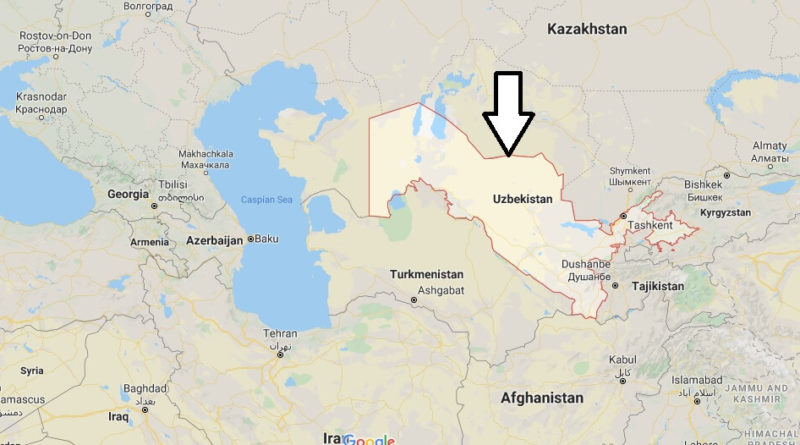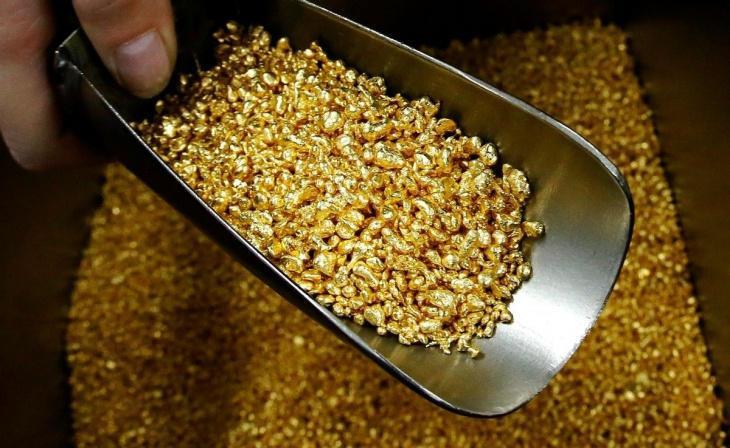The name Uzbekistan literally means “land of the Uzbeks.” The ending -stan comes from Persian, meaning “land of.” There are a few different thoughts on the origins of the word Uzbek: it could come from the Turkic for “own master,” or it could be a reference to the Oghuz tribe.
Uzbekistan is located in Central Asia, surrounded by Kazakhstan to the west and north; Kyrgyzstan and Tajikistan to the east; and Afghanistan and Turkmenistan to the south. The country is only one of two doubly landlocked countries (meaning, surrounded by other landlocked countries; the other one being Liechtenstein). Uzbekistan has several basins that don’t drain water (called endorheic basins), and there are no rivers that drain into the seas. One of these endorheic lakes that has diminished so much that it’s now an environmental disaster is the Aral Sea, on the border with Kazakhstan (more on that later). Much of the country is filled with mountains and the Kyzylkum Desert. Teh majority of the country falls under the arid continental climate, with more temperate areas in the northern part and more subtropical ones in the southern regions.
 |
| Ancient city of Bukhara |
The Scythians were the first ones to venture across into what is now Uzbekistan during the first millennium BC. Bukhara and Samarkand were two of the first major cities to emerge early on, to be followed by several other cities over the next few centuries. The development of the Silk Road ran straight through Uzbekistan lands, a great trade route between East Asia, Southeast Asia, the Arabian peninsula, East Africa, and Southern Europe. Named after the silk trade, it also included pottery, spices, and other wares. Persia turned this area into one of their provinces called Transoxiana. Although Alexander the Great conquered the Persian Empire, it was later conquered by the Arabs and became one of the centers after the Islamic Golden Age (including a center for scholars studying trigonometry, astronomy, philosophy, calligraphy, poetry, and other subjects). Genghis Khan made his way with his crew through Central Asia during the 13th century; however, even after Genghis died, it remained in the hands of his son, Chagatai. One chieftain and conqueror called Timur (also known as Tamerlane) emerged as a leader of this region, but he was also a brutal tyrant. After Timur died, the place kind of fell apart. There was a lot of fighting between different groups living in Transoxiana, and nomadic Uzbek tribes roaming in the northern parts started paying attention. They took the opportunity to organize and invade. Around the same time, the Khanate of Bukhara made the decision to establish a slave trade (boo, hiss, terrible decision). During the 19th century, the Russians started looking at real estate in Central Asia. The period from about 1813 to around 1917 was known as “The Great Game” (such a thoughtless and pejorative name, I know: this refers to a time when Russia and Britain were looking at taking over lands in Central and South Asia). Even with some resistance, these Uzbek lands were considered part of Russia from the beginning of the 1920s, and soon, the Uzbek Soviet Socialist Republic was born. Over 1.4 million Uzbeks fought with the Soviets against Nazi Germany. But there were also a number who fought for Germany, too. They remained part of Soviet Russia until Russia broke up in 1991, and Uzbekistan declared its independence. Throughout the 1990s, the lack of foreign investment and other factors led to a rise in the extreme forms of Islam and militant groups. Serious issues of human rights violations plague much of their modern history in the last 20 years.
 |
| Tashkent |
Tashkent is the capital and largest city in Uzbekistan. Genghis Khan actually destroyed the city in 1219, but it was rebuilt and profited well from its location along the Silk Road. When the Russians took over in the mid-1800s, Tashkent became the capital of Russian Turkestan. The city was again destroyed in 1966 from an earthquake, which the Russians rebuilt as one of their model cities. Today, it’s a multi-ethnic city and located in the northeastern corner of the country, only about 8 miles from the Kazakh border. There are quite a few universities, historical buildings, markets and shopping malls, sports venues, museums, and theatres.
Uzbekistan does a lot of mining: they’re 8th in the world for gold, 10th for copper deposits, 12th for uranium deposits, 7th for uranium production, and 11th for natural gas production. Agriculture employs over a quarter of the population, with cotton being the top product. However, their economy struggles because of the difficulty in converting their currency, which makes it hard for other countries to do business with them. They also have a lot of income inequality because even though things like gold and uranium and natural gas make a lot of money, that money mainly stays at the upper levels of the government and rarely finds its way to the people. Couple all of that with high inflation and general corruption, it’s easy to see why they struggle. But thanks to some changes that have been made to improve this and that the markets for their top exports are key, Uzbekistan has been predicted to be one of the up-and-coming markets in the future, if all goes well.
Uzbekistan declared itself as a secular country, but Islam makes up the majority religion. Nearly 88% of the population follows Islam (and mainly Sunni) while about 9% follow Russian Orthodox. During the years it belonged to Soviet Russia, all religious affiliations were discouraged. Even in the 1990s, there were still a significant number of Jews and Zoroastrians living in Uzbekistan. In the last five years (since 2015), Islamic extremist groups have seen an uptick of interest in Uzbekistan.
 |
| Counting in Uzbek |
The Uzbek language is part of the Turkic language family and closely related to Uyghur. Since its independence, it’s been the official language and is written in Latin letters. A regional language called Karakalpak, a language similar to Kazakh, has been given an official status in the region of Karakalpakstan. Tajik and Kazakh are also spoken in several areas of the country, and although Russian has no official status in Uzbekistan, it’s still used in certain situations and environments (government, technical, business documents, for example).
I’m terror-fascinated at the story of the Aral Sea. It was once the fourth largest inland sea in the world. The Russians figured out a way to use the sea to irrigate the cotton fields during the 1960s. However, they did it in such an extremely unsustainable way that they basically drained it. On top of that, they used a crap ton of chemical pesticides and fertilizers as well. So much so, that it’s shrunk to half of what it was and nearly three times its original volume. Now, Uzbekistan has a water shortage problem, and they have started looking at other sources, including underground water sources and building reservoirs. But the damage has been done to the land; it’s been spoiled and destroyed. And as the sea levels have decreased, it exposed an island in the middle of this that the Russians decided to use as a secret biological weapons testing site (nothing can go wrong here). Three years before Russia broke up, they buried all their evidence of what they were doing on the island, so now it’s rife with live anthrax and other highly toxic poisons. So, that’s just… great. Thanks, I hate it.
Up next: art and literature





No comments:
Post a Comment